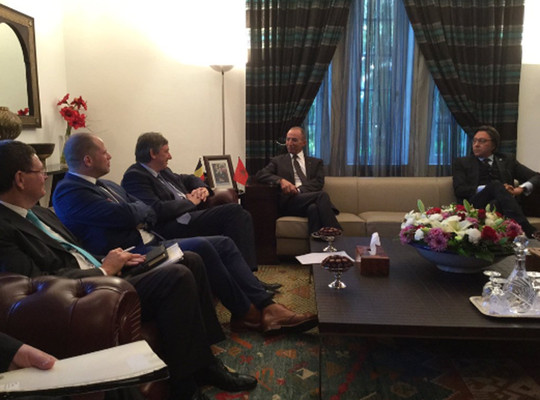You are here
Agreement with Morocco about checking fingerprints is a European first

After ten years of negotiations, the Belgian government has reached a principle agreement with Morocco that is intended to guarantee better cooperation in the fight against illegal migration, organised crime and terrorism. For example, Belgium is the first country in Europe to receive a promise from the Moroccan government to exchange and check electronic fingerprints.
Since Morocco requires its citizens to have their fingerprints registered at eighteen years of age, the country has a large electronic fingerprints database. “It is an interesting source of information,” says Minister of Security and the Interior Jan Jambon. “Not only for identification of criminals, but also for people who apply for asylum here.” In addition, this database has recently been digitalised, so that it is now also easier to consult.
Quicker identification
Last year, our police intercepted more than 3,500 Moroccans without valid documents. “That doesn’t equal 3,500 illegal immigrants, because some people have been arrested multiple times,” State Secretary for Asylum and Migration Theo Francken explains. “Identifying Moroccans who are staying here illegally is not always a piece of cake. In order to register as refugees, many pretend to be Iraqi for example. If our departments can then quickly and easily have the fingerprints of those people checked against that Moroccan database, they can quickly find out whether their story is true or not.”
The fingerprints database also comes in handy in the fight against organised crime and terror. For example, Belgian jails currently hold over 500 Moroccans without legal residence status. However, it is currently difficult to prove that they really are Moroccan citizens, so that those prisoners can be sent back to Morocco. This also applies to the 800 suspects of the Belgian anti-terror body OCAD, many of whom are Moroccan or have roots in that country.
Quicker response
Currently there is no fixed term within which Morocco must respond to Belgian questions about identification. In practice it takes about sixty days, but sometimes there is no response at all. That should all change with this principle agreement, as the Moroccan authorities are undertaking to respond to Belgian questions within 45 days. “That is also important for the closed centres, where people await mandatory repatriation. Quicker identification would lead to quicker repatriation, increasing the number of places that are freed up,” Theo Francken explains. In 2015, there were 336 mandatory repatriations of Moroccans.
But quicker identification is not by any means all. “In order to repatriate someone effectively, you also need an official document from the embassy of the country of origin. That is where diplomacy is often a bumpier ride, so from that point of view too it is good that this agreement has been reached,” Theo Francken concludes.
In exchange for closer cooperation with Belgium, Morocco can count on more police cooperation and data in the fight against terror. The Moroccan minister of Domestic Affairs will officially sign the agreement during a visit to our country in April.

